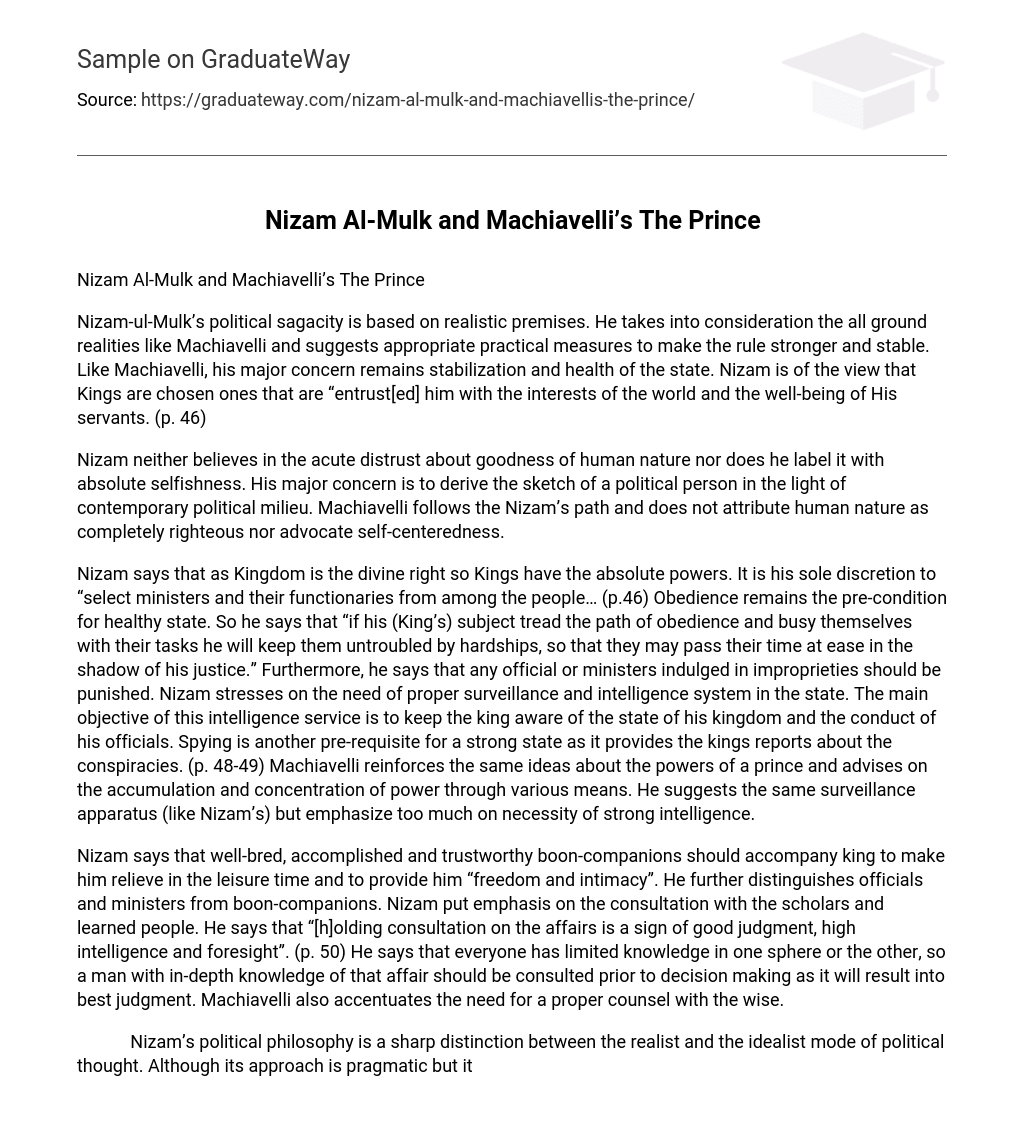Nizam-ul-Mulk’s political sagacity is based on realistic premises. He takes into consideration the all ground realities like Machiavelli and suggests appropriate practical measures to make the rule stronger and stable. Like Machiavelli, his major concern remains stabilization and health of the state. Nizam is of the view that Kings are chosen ones that are “entrust[ed] him with the interests of the world and the well-being of His servants. (p. 46)
Nizam neither believes in the acute distrust about goodness of human nature nor does he label it with absolute selfishness. His major concern is to derive the sketch of a political person in the light of contemporary political milieu. Machiavelli follows the Nizam’s path and does not attribute human nature as completely righteous nor advocate self-centeredness.
Nizam says that as Kingdom is the divine right so Kings have the absolute powers. It is his sole discretion to “select ministers and their functionaries from among the people… (p.46) Obedience remains the pre-condition for healthy state. So he says that “if his (King’s) subject tread the path of obedience and busy themselves with their tasks he will keep them untroubled by hardships, so that they may pass their time at ease in the shadow of his justice.” Furthermore, he says that any official or ministers indulged in improprieties should be punished. Nizam stresses on the need of proper surveillance and intelligence system in the state. The main objective of this intelligence service is to keep the king aware of the state of his kingdom and the conduct of his officials. Spying is another pre-requisite for a strong state as it provides the kings reports about the conspiracies. (p. 48-49) Machiavelli reinforces the same ideas about the powers of a prince and advises on the accumulation and concentration of power through various means. He suggests the same surveillance apparatus (like Nizam’s) but emphasize too much on necessity of strong intelligence.
Nizam says that well-bred, accomplished and trustworthy boon-companions should accompany king to make him relieve in the leisure time and to provide him “freedom and intimacy”. He further distinguishes officials and ministers from boon-companions. Nizam put emphasis on the consultation with the scholars and learned people. He says that “[h]olding consultation on the affairs is a sign of good judgment, high intelligence and foresight”. (p. 50) He says that everyone has limited knowledge in one sphere or the other, so a man with in-depth knowledge of that affair should be consulted prior to decision making as it will result into best judgment. Machiavelli also accentuates the need for a proper counsel with the wise.
Nizam’s political philosophy is a sharp distinction between the realist and the idealist mode of political thought. Although its approach is pragmatic but it does not counteract the idealist precepts that kings and monarch should work for the betterment and development of its state and people. Like Machiavelli, his sole concern was not only to offer proper and practical advice offered to a monarchical ruler designed to keep that ruler in power but to make him popular among masses.
However above-mentioned similarities exist between the political philosophies of Machiavelli and Nizam-ul-Mulk but there is divergence on the matter of religion. Nizam-ul-Mulk considers is necessary for a king to acquire the knowledge of religion and should take into account the religious practices whereas Machiavelli denounces the institutionalized Christian church. He advises the prince to neglect the common morality and ethics propagated by Christian church. Overall, it seems that Machiavelli’s political thought is a European prototype of Nizam-ul-Mulk political teachings.
Feedback:
It has provided a great comparative analysis. Although essay has provided insight into the political philosophy of Nizam by using the quotations from Nizam’s primary work, but it has not provided same quotations from Machiavelli’s The Prince to support his viewpoint. However, the basic thesis that both political philosophies were based on practical necessities has been strengthened by strong arguments.





